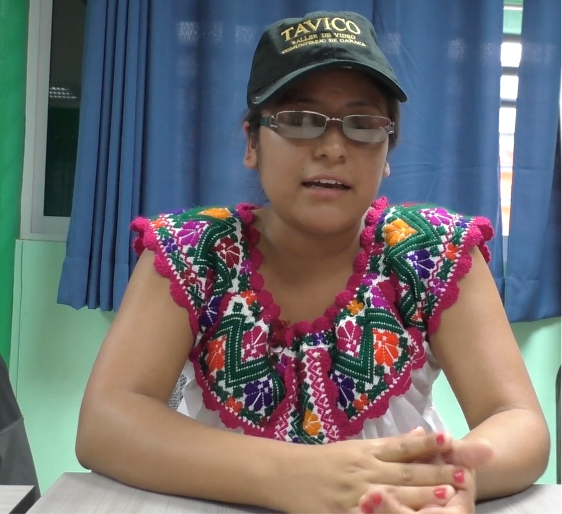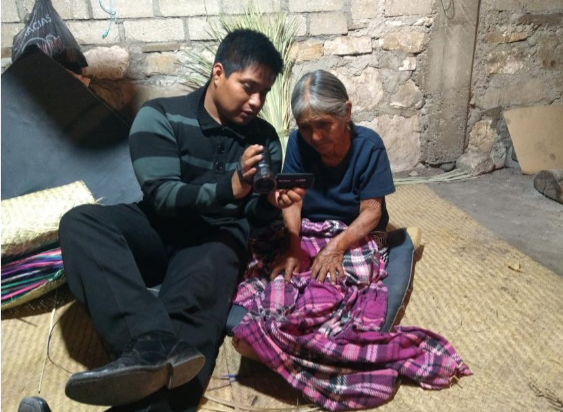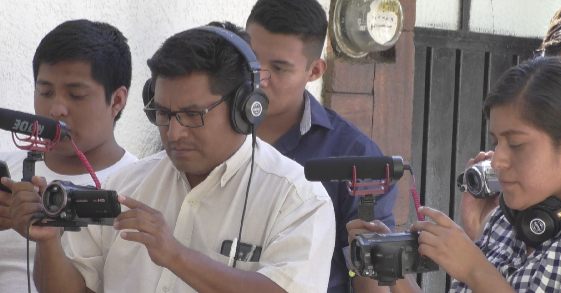SPEAKING PLACE NEWS
Lapomosine - October 2024
October 2024: In collaboration with sponsor Maine Media College in Rockport, Maine, Speaking Place Board member Brianna Smith will be Co-Instructor for Passamaquoddy Community Self-Documentation Training. Lapomosine (Let’s Look at Ourselves) is an ongoing series of video workshops with cell phones using methods originally developed by Speaking Place with Indigenous filmmakers in Oaxaca, Mexico. While the Fall 2024 Maine workshops are now fully subscribed, future training sessions will be scheduled. View Lapomosine projects HERE.
Meritorious Service Decorations - February 2024
Congratulations to Speaking Place Board Chair Robert Leavitt and Board Member Margaret Apt on receiving Meritorious Service Decorations! According to the website of the Governor General of Canada, “The MSD (Civil Division) is one of the highest distinctions a Canadian civilian can receive. Any Canadian or non-Canadian whose accomplishments or activities have demonstrated an outstanding level of service or set an exemplary standard of achievement and have brought honour or benefit to Canada is eligible to receive an MSD.” Robert and Margaret have been recognized for their decades of work on Passamaquoddy language, and specifically Peskotomuhkati Wolastoqewi Latuwewakon (A Passamaquoddy-Maliseet Dictionary), accessible online at PMPortal.org and in print (University of Maine Press 2008), with a second print edition now in development. Similarly, Dictionary Co-Author David Francis was honored posthumously.
“ANYUKOJMIT: We Are Totontepecanos” - November 2023
Screening of Ben Levine’s new documentary film “ANYUKOJMIT: We Are Totontepecanos” at the Rockland Public Library, Rockland, Maine, on November 9, at 6:30 p.m.. Perched among the highest mountains in the Sierra Mixe cloud forest of Southern Mexico, the village of Totontepec and its culture open up over 12 years of filming in and by the community to reveal a worldview to inspire us all. Filmmaker Ben Levine and Producer Julia Schulz will be present to lead an audience discussion about the people and cuisine in this beautiful and entertaining 46-minute film. This event is co-sponsored by Rockland’s Good Tern Co-op Food Store.
International Mother Tongue Day 2023 - February 2023
In celebration of International Mother Tongue Day 2023, Co-Directors Ben Levine and Julia Schulz travel to Los Angeles to present the Speaking Place Mexico Video Archive to the Library at California State University - Los Angeles, Special Collections. The archive includes approximately 9 terabytes of community and language documentation from nearly 20 Indigenous communities in Oaxaca State, Mexico, from 2009 to 2022. Speaking Place Staff and Board members are delighted with this collaboration with the CalStateLA Library and the Department of Anthropology and hope the archive will grow as new community video projects in the TAVICO training program come to fruition.
The Intersection - February 2022
Speaking Place Co-Directors Ben Levine and Julia Schulz were part of the origins of the new and brilliant documentary film “The Intersection/Le Carrefour” directed by Jessamine Irwin and Daniel Quintanilla and filmed in Lewiston, Maine. The film won the audience award for best short documentary at the 2021 Camden International Film Festival. To learn more and sign up for announcements of upcoming screenings, visit the website: https://lecarrefourfilm.com
From the film’s website:
“ABOUT THE FILM : Cecile reconnects with the French of her childhood thanks to recently arrived Franco-African immigrants, like Tresor, seeking asylum in Cecile’s hometown of Lewiston, Maine. Cecile’s Franco roots tie her to the thousands of French-Canadians who came before her to power the local mills, and who suffered from decades of discrimination and oppression. As history repeats itself, Cecile and Trésor develop a close friendship that helps Cecile finally find her pride in being Franco-American.”
“At a time when more and more people are taking notice of the renewed Francophonie in Maine, we at the French Consulate in Boston are grateful to the filmmakers for shining a light on the person-to-person relationships being developed amongst old and new francophone communities. I strongly recommend this film to anyone seeking a better understanding of what Francophonie means in Maine today.” - Olivier Favry, Cultural Attaché
Early video presentation on line - January 2022
Peoples Video Theater/Survival Arts Media leaders Howard Gutstadt and Ben Levine presented samples of their 1970s early videos in “Activist Video to Immersive Media,” an online event organized by Media Burn, an archive based in Chicago, and co-sponsored by the Bay Area Video Coalition. To watch their presentation, click on the image below.
Online TAVICO orientation workshop - December 2021
Speaking Place hosted an online workshop in Spanish to introduce to new partners in Mexico our approach to video documentation of language and cultural practices as part of TAVICO (Taller de Video Comunitario de Oaxaca). Many thanks to the new Co-Directors of TAVICO Dr. Salvador Galindo Llaguno and Prof. Aaron Sonnenschein, also to instructors and mentors Daniel Quintanilla, Saúl Reyes Cortes, and Ben Levine. Welcome and thanks for joining to Mérida-based filmmaker Adriana Otero Puerto and representatives from Yucatán Maya and Chontal communities. ¡Bienvenidos a todos! Muchas gracias y saludos desde Maine, y adelante con la autodocumentación de la comunidad.
TAVICO Video Editing Workshop in Oaxaca - JUNE 2021
In mid-June, after several other attempts were cancelled due to the pandemic, Speaking Place hosted a video production workshop in collaboration with CEDELIO, in Oaxaca, Mexico. Coordinator Salvador Galindo LLaguno joined Mexico City based Filmmaker Samuel Padilla Adorno bringing video editing and advanced shooting and presentation skills to four members from three indigenous Oaxacan regions. A new trainee from the Chontal community joined those who had attended workshops in 2019 with TAVICO (Taller de Video Comunitario de Oaxaca / Oaxaca Community Video Workshops).
Samuel Padilla Adorno explains techniques in video editing to Lucas López Garcia (left) and Oscar Morales Hernández (right), Sierra Norte Zapotec speakers and participants in the 2019 and June 2021 TAVICO filmmaking workshops.
Speaking Place Staff News – JUNE 2020
Co-Director Ben Levine shared clips of early video he had produced in the 1970s with Howard Gutstadt as part of the video collective People’s Video Theater/Survival Arts Media, some of which was featured in the highly acclaimed documentary “Crip Camp.”
Maine filmmakers helped revive long-lost footage that will appear in a Netflix documentary, Crip Camp, Bangor Daily News – FEBRUARY 2020
Speaking Place Co-Director Ben Levine videotaped teens with disabilities at a summer camp in upstate New York in 1971.
Maine Charity Working to Preserve Languages Worldwide, Lewiston Sun Journal – FEBRUARY 2020
In a modest house not far from the harbor, Julia Schulz and Ben Levine are working to revive endangered languages from Maine to Mexico. [READ MORE]
February 2020: A sign of emergence of language awareness leading to language revival – This mural with its tagline: “I speak Zapotec,” was created by a community collective in the town of San Blas Atempa, in the Istmo region of Oaxaca, Mexico, after a Speaking Place video feedback experience there. [READ MORE]
Speaking Place Sponsorship – FEBRUARY 2020
Speaking Place is proud to be the fiscal sponsor for a documentary film in development currently titled “Le Carrefour/The Intersection,” which has just received the very first TV5Monde Maine Heritage Grant, in partnership with the Camden International Film Festival. From CIFF’s newsletter: “The project highlights Francophone communities in Maine that are a vital part of our state's history and current cultural landscape.” Congratulations to Co-Directors Jessamine Irwin and Daniel Quintanilla!
Trésor Muteba, 34, of Lewiston, Maine is working closely with documentary filmmakers Daniel Quintanilla and Jessamine Irwin on the development of “Le Carrefour / the Intersection.
New publication – April 2020
Speaking Place Staff and partners collaborated on a presentation and article recently published in Papers of the 49th Algonquian Conference: "The Passamaquoddy-Maliseet Language Portal: Who Uses It and How?”.
Maine filmmakers helped revive long-lost footage that will appear in a Netflix documentary – FEBRUARY 2020
A recent Bangor Daily News article by Lauren Abbate described how Speaking Place Co-Director Ben Levine, as part of the experimental early video collective People’s Video Theater, videotaped disabled teens at a summer camp in upstate New York in 1971—and how that footage found its way into the acclaimed 2020 Netflix documentary “Crip Camp.”
12 Future Leaders Trained in First Regional Approach to Language Revitalization – JUNE 2019
Soledad García de los Santos is a Chatino-speaking university student from a mountain village in Oaxaca, Mexico, who is happiest wearing the colorful embroidered blouses typical of her region. Ricardo Jiménez Jiménez, an aspiring actor, is a Mixtec speaker from central Oaxaca. What they have in common, along with ten other students representing four other languages, is a commitment to work together to revive their endangered languages using the Speaking Place methodology. The students learned these methods over three weeks of training this winter in Oaxaca.
An interdisciplinary team led the Community Video Workshop of Oaxaca (TAVICO): five Oaxacan instructors along with Ben Levine, Julia Schulz, and Robert Leavitt from Speaking Place. The team provided intensive training and practice in camera and sound work and practice in Feedback Filming: video presentation and facilitation of discussion—an essential part of Speaking Place’s unique approach to language documentation and revitalization. The methods have been honed over fifteen years working with the Passamaquoddy of Maine and the Mixe (mee-hay) of Oaxaca. Participants are now engaging their own indigenous communities using TAVICO tools, and are already brightening the future of their languages.



A collaborative effort, TAVICO addresses the needs of communities whose social stability depends on conservation of language, identity, and land. The pilot unites Speaking Place with the Universidad Autónoma Benito Juárez de Oaxaca (UABJO) and the Centro de Estudios y Desarrollo de las Lenguas Indígenas de Oaxaca (CEDELIO), which promotes the strengthening and preservation of indigenous languages. Our interdisciplinary team is committed to making regional language and community revitalization sustainable, helping communities adapt and evolve as they meet the challenges of globalization and climate change.
How do we measure the need for such assistance? The call for applications to the TAVICO program on the CEDELIO Facebook page received 12,000 visits in two weeks. Currently there are ten communities waiting to participate in the next round of training—places where young people like Soledad and Ricardo are eager to bring these resources to serve their communities.
In this video (https://vimeo.com/336006769), TAVICO participants talk about the workshops and how they help them to better serve their communities. All of the footage was shot by participants in their towns after their first workshop week.
‘Waking up French’ - documentary film explores emigration–The Valley Breeze
“It will touch the hearts of today’s French Canadian descendants whose parents and/or grandparents made the difficult decision to leave their beloved homeland in the hopes of a better life for themselves and their children.”
–AFGS publisher Sylvia Bartholomy
September 6, 2017
Article by Sandy Seoane
Eleanor Stevens
PHOTO BY JENNIFER MITCHELL/MPBN
Passamaquoddy Tribe Looking to Children to Preserve Language – MPBN
Languages across the world are disappearing as fewer people learn to speak, read, and write the words of their ancestors. Research suggests that roughly half of the 7,000 languages currently spoken will be gone by the start of the next century. . .
December 23, 2015
Author: Jennifer Mitchell
New school seeks to keep language alive. – The Quoddy Tides
“Our number one goal is to create new speakers," says Donald Soctomah, the project administrator for a new language immersion school to teach the Passamaquoddy language to children ages 3 to 5. The tribe recently was awarded a three-year $750,000 grant for the program from the U.S. Department of . . .
November 13, 2015
Author: Edward French
Passamaquoddy Tribe to Launch Language Immersion Program – Bangor Daily News
PLEASANT POINT, Maine — A three-year, $750,000 federal grant from the Administration for Native Americans (ANA) is aimed at helping the Passamaquoddy revive their language.
The tribe will use the money to develop two language immersion programs for preschoolers and a handful of adults — one at each of the reservations in Pleasant Point and Indian Township, said Donald Soctomah, who is serving as administrator as an in-kind contribution required by the grant . . .
October 28, 2015
Author: Johanna S. Billings
Endangered Languages – The New Yorker
The New Yorker magazine published a letter by Ben Levine and Julia Schulz in response to a feature article on endangered languages.
"We read with interest Judith Thurman’s piece on attempts to save dying languages (“A Loss for Words,” March 30th). There’s a quip among workers in New England nursing homes that goes, “They come in speaking English, and they go out speaking gibberish.”
May 4, 2015
Authors: Ben Levine & Julia Schulz
Passamaquoddy Language Portal Now Offers Access on Mobile Devices – Bangor Daily News
Quietly, the Passamaquoddy-Maliseet-speaking people of Eastern Maine and New Brunswick have been making history, taking their language and lifeways to far-flung community members, linguists, and scholars around the world on line via a groundbreaking web application developed in collaboration with Speaking Place of Rockland and Northeast Historic Film of Bucksport. That application, called an Endangered Language Portal, or, in this case Passamaquoddy-Maliseet Language Portal, links the 19,000-word Passamaquoddy on-line dictionary with over one hundred videos produced by documentarians Ben Levine and Julia Schulz of Speaking Place . . .
January 27, 2014
Author: Julia Schulz
Reviving Passamaquoddy: A Community Finds Healing in Its Own Words – Cultural Survival Quarterly
The first school was built in Motahkomikuk, a Passamaquoddy community in northeastern Maine, in the late 1930s. St. Ann’s Indian Mission School, run by Catholic nuns, enrolled children from Motahkomikuk and nearby Sipayik, the two reservations where most Passamaquoddy live. The children, who spoke Passamaquoddy, came to school only to find that English was required. . .
December 2012
Author: Meg Holladay















